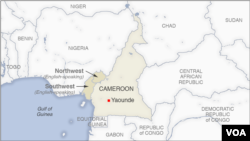Fresh clashes between Cameroon's military and separatists have left at least 16 people dead since Sunday, including women and children.
The military said one of the attacks in the northwestern village of Babanki was provoked by rebels, who beheaded a soldier dispatched to protect civilians. But Babanki villagers who fled to safety blame both the rebels and the military for atrocities.
In a video shared on social media that has sent shock waves among Cameroonians, armed men in red shirts claiming to be rebel fighters display and kiss the decapitated head of a soldier.
Tens of villagers watch helplessly as the rebels said they will crush anyone who stands in their way to self-determination.
Brigadier General Valere Nka is commander of Cameroon’s troops in the northwest where they are fighting the separatists.
He said the video was recorded in the English-speaking village of Babanki, where one of his men dispatched to protect civilians was killed and his head chopped off.
Nka said after the gruesome video surfaced, he launched an attack over the weekend on the rebels in Babanki.
He said they killed ten rebel fighters, including their general, seized many war weapons and two vehicles, and rescued one hostage. Nka said his men will continue destroying the rebels if they fail to lay down their weapons and surrender.
However, local media reported that besides the rebels, who call themselves Ambazonians, six civilians — including children — were killed in the clash and six houses torched.
Rebel leader Samuel Sako said the men in the video were acting on military instructions to discredit the separatists. In another video circulated on social media on March 2, he asserts the military killed numerous women and children in recent attacks
"They are not targeting our soldiers because they cannot face them,” Sako said. “They are going about in the communities that they pretend to protect, pulling people from their houses and shooting them, killing babies. I am sick and tired."
Cameroon’s military said Tuesday that three of the fighters they shot in Babanki were women, and acknowledged that civilians could have been killed as collateral damage. But the military rejected the possibility that troops would have targeted civilians, despite accounts from villagers.
Grace Vubangsi, a 31-year-old nurse, said she fled the violence in Babanki to Yaounde.
She saw the body of a baby and her mother dumped at the village square, she said, and her colleagues said villagers buried four other bodies.
"We cannot have a military that claims that it protects people when they only come after the Ambazonians, have come and killed people, and then they come and start killing without even seeing where the problem is or even attacking the Ambazonian fighters,” Vubangsi said.
The clashes in Babanki comes two weeks after a similar military attack in the northwest village of Ngarr-buh left at least 22 people dead, including a woman and four children.
The government of Cameroon said the five civilians got caught up in the fighting while critics labeled the attack a massacre.
After international pressure, Yaounde created a commission of inquiry to investigate the deaths.
Cameroon deployed over a thousand additional troops to its English-speaking regions in January ahead of Feb. 9 elections that rebels vowed to disrupt.
The troops have remained as the constitutional council ordered a rerun of polls in parts of the English-speaking regions. The council found the military collaborated with the government to commit election fraud and ballot stuffing.
Cameroon’s government has rejected the accusation.
Cameroon’s anglophone rebels have been fighting since 2017 to create an independent, English-speaking state in the majority French-speaking country’s western regions.
The U.N. said the conflict has cost more than 3,000 lives and forced half a million to flee to French-speaking regions of Cameroon or into neighboring Nigeria.




